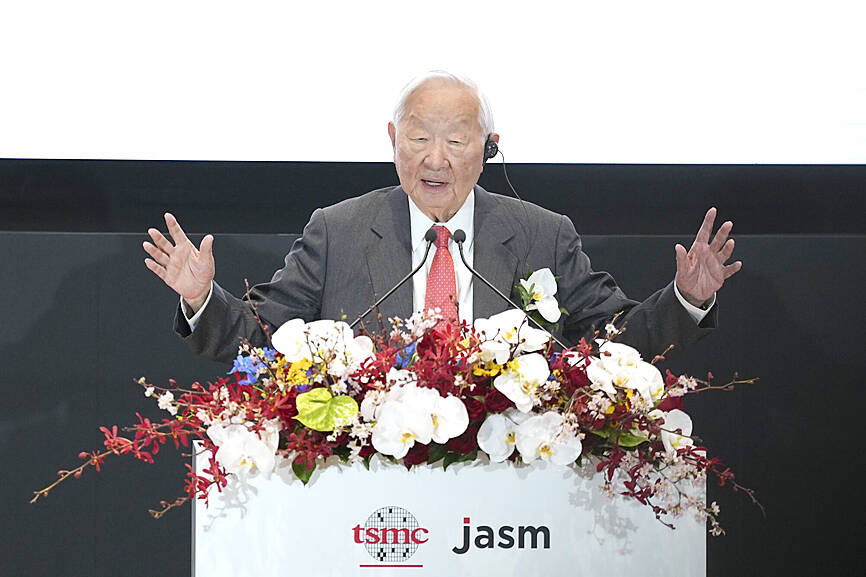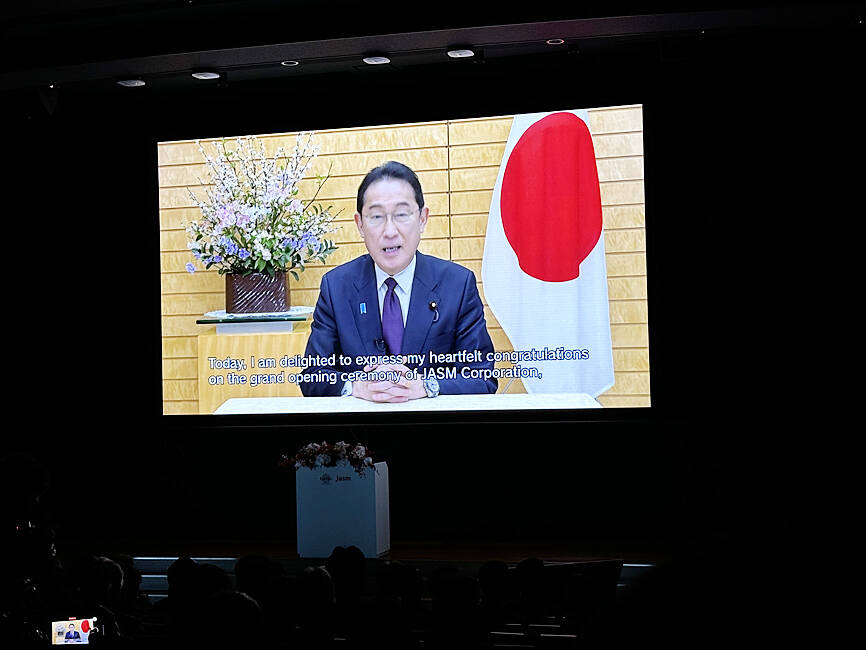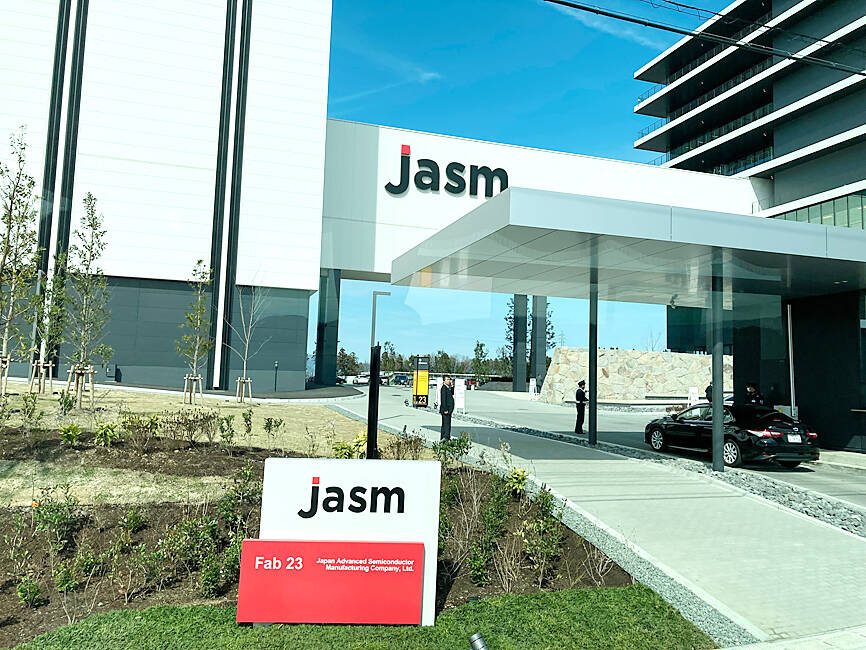Taiwan Semiconductor Manufacturing Co (TSMC, 台積電) yesterday held an opening ceremony for its first chip manufacturing fab in Kumamoto, Japan, which it hopes will improve chip supply resilience and help Japan usher in a semiconductor renaissance.
The Kumamoto fab is slated to enter volume production in the fourth quarter of this year.
The Japanese government said it would extend its financial support of the project to include the construction of a second factory, as TSMC’s investment is crucial to its efforts to revive its semiconductor industry.

Photo: Bloomberg
The Kumamoto fab is owned by a joint venture, Japan Advanced Semiconductor Manufacturing Inc (JASM), which is majority-owned by TSMC. Other partners include Sony Corp and Denso Corp. Toyota Motor Corp joined the venture early this month.
The second fab would use cutting-edge 6-nanometer technology to produce advanced chips to meet growing demand for artificial intelligence (AI) chips, and those used in autonomous vehicles.
“The production of advanced logic semiconductors at JASM is a significant step in both our country’s semiconductor industry and user industries,” Japanese Prime Minister Fumio Kishida said in a prerecorded video during the opening ceremony.

Photo: CNA
The Japanese government has implemented unprecedented support for the development of a domestic manufacturing base for advanced semiconductors, Kishida said.
“As a government, based on the Domestic Investment Promotion Package formulated in December last year, we will continue to swiftly implement support measures such as budget, tax system and regulatory reform,” Kishida said.
The Japanese government has said that it plans to offer about ¥1.2 trillion (US$7.97 billion) in subsidies for the two Kumamoto fabs.

Photo: Lisa Wang, Taipei Times
The construction of the Kumamoto factory went surprisingly well, as it took only one-and-a-half years rather than the 10 years it usually takes for a ¥1 trillion project like this one, Kumamoto Prefecture Governor Ikuo Kabashima said during the ceremony.
During a speech, TSMC founder Morris Chang (張忠謀) said the event reminded him of his first trip to Japan 56 years ago, while he was serving as an integrated circuits executive at Texas Instruments Inc.
He was there in 1968 to talk with Sony cofounder Akio Morita about starting a joint venture, Chang said.
Morita told him he would be pleasantly surprised about the yield he would achieve in Japan, he said.
That prediction came true, and at its height, Texas Instruments operated three semiconductor factories in Japan, he said.
Fifty years after his conversation with Morita, he is again waiting to see if he “will be pleasantly surprised by the yield,” Chang said.
It would be harder this time, because TSMC has a good yield in Taiwan, but he still has high hopes for JASM, he said.
The new JASM fab would “improve the resilience of the chip supply for Japan and for the world,” Chang said. “It will also, I hope and I believe, start a renaissance of semiconductor manufacturing in Japan.”
Semiconductors will be “very much-needed in the future,” driven by demand for AI applications, he said.
AI chip demand would be enormous, requiring tens of thousands wafers and 10 fabs, he said.

CHAOS: Iranians took to the streets playing celebratory music after reports of Khamenei’s death on Saturday, while mourners also gathered in Tehran yesterday Iranian Supreme Leader Ayatollah Ali Khamenei was killed in a major attack on Iran launched by Israel and the US, throwing the future of the Islamic republic into doubt and raising the risk of regional instability. Iranian state television and the state-run IRNA news agency announced the 86-year-old’s death early yesterday. US President Donald Trump said it gave Iranians their “greatest chance” to “take back” their country. The announcements came after a joint US and Israeli aerial bombardment that targeted Iranian military and governmental sites. Trump said the “heavy and pinpoint bombing” would continue through the week or as long

TRUST: The KMT said it respected the US’ timing and considerations, and hoped it would continue to honor its commitments to helping Taiwan bolster its defenses and deterrence US President Donald Trump is delaying a multibillion-dollar arms sale to Taiwan to ensure his visit to Beijing is successful, a New York Times report said. The weapons sales package has stalled in the US Department of State, the report said, citing US officials it did not identify. The White House has told agencies not to push forward ahead of Trump’s meeting with Chinese President Xi Jinping (習近平), it said. The two last month held a phone call to discuss trade and geopolitical flashpoints ahead of the summit. Xi raised the Taiwan issue and urged the US to handle arms sales to

BIG SPENDERS: Foreign investors bought the most Taiwan equities since 2005, signaling confidence that an AI boom would continue to benefit chipmakers Taiwan Semiconductor Manufacturing Co’s (TSMC, 台積電) market capitalization swelled to US$2 trillion for the first time following a 4.25 percent rally in its American depositary receipts (ADR) overnight, putting the world’s biggest contract chipmaker sixth on the list of the world’s biggest companies by market capitalization, just behind Amazon.com Inc. The site CompaniesMarketcap.com ranked TSMC ahead of Saudi Aramco and Meta Platforms Inc. The Taiwanese company’s ADRs on Tuesday surged to US$385.75 on the New York Stock Exchange, as strong demand for artificial intelligence (AI) applications led to chip supply constraints and boost revenue growth to record-breaking levels. Each TSMC ADR represents

Pro-democracy media tycoon Jimmy Lai’s (黎智英) fraud conviction and prison sentence were yesterday overturned by a Hong Kong court, in a surprise legal decision that comes soon after Lai was jailed for 20 years on a separate national security charge. Judges Jeremy Poon (潘兆初), Anthea Pang (彭寶琴) and Derek Pang (彭偉昌) said in the judgement that they allowed the appeal from Lai, and another defendant in the case, to proceed, as a lower court judge had “erred.” “The Court of Appeal gave them leave to appeal against their conviction, allowed their appeals, quashed the convictions and set aside the sentences,” the judges